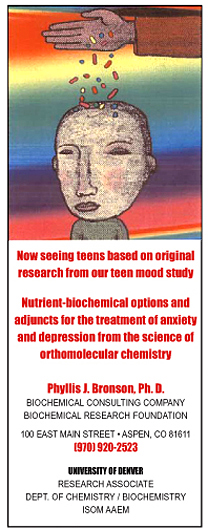By
Jennifer Davoren
Aspen Times Staff Writer
They sulk, they pout and, on occasion, lash out.
The actions of some teenagers can bewilder parents, at least those
who can't recall their own adolescent misery. And though the dilemma of dealing
with a "moody" teen isn't a new one, some seem to think the situation
has intensified.
"Parents keep asking me if teens are getting worse--and they
are," said local scientist Phyllis Bronson.
Bronson knows a little something about mood swings--and, thanks
to her doctorate in neurobiochemistry, the biological basis for them. Bronson,
with the help of Aspen physician Dr. Kenton Bruce, recently completed a four-year
study on the mood biochemistry of aging women--namely, how hormones affect the
female brain.
Managing
Moods without Meds
Phyllis Bronson Helps Angry Boys & Sullen Girls
Teenage
Mood Swings

This study of the "brain-body connection"
resulted in attention from Aspen's health-conscious populace. Bronson and Bruce
presented two sold-out lectures on the subject at the Given Institute last year,
helping standing-room-only crowds of women with their midlife mood shifts.
Bronson's progress with women was so well-received that she decided
to try her hand at another troubled group: teenagers.
"I don't see men, because they think they don't have moods,"
Bronson laughed.
"When we were finishing the women's mood study, Bronson continued,
we got so many calls from around the country asking for help for kids. so I
started seeing the occasional child. I was encouraged to start doing more."
Bronson's involvement led to her latest study--one she's titled
"Moody, Sullen Girls and Angry, Hostile Boys"
in honor of her subjects. Bronson has presented preliminary findings from this
study at scientific conferences such as the American Academy of Environmental
Medicine's latest gathering. Bronson's planned four-year study on teenage moods--and,
of course, the biochemical basis for them--could eventually translate to happier
kids and healthier families.
Challenging Prozac
About 5 million American children will wake up this morning and pop some sort
of mood-altering pill.
"Isn't that scary?" Bronson asked with a shake of her
head.
Bronson has never been big on psychiatric drugs. She cofounded
the Aspen Clinic for Preventive and Environmental Medicine with Aspen physician
Dr. Harold Whitcomb in 1983 and, after Whitcomb's recent retirement, the business
was reincarnated as Biochemical Consulting.
That's biochemical rather than pharmaceutical.
Bronson's tactics with the "Sullen Girls/Hostile Boys"
study involves the regulation of neurochemicals. When Bronson brings a child
into her study, she first analyzes their brain chemistry.
Bronson uses a series of amino acid and fatty acid supplements
that affect the child's neurochemistry--basically boosting different areas of
brain development. That way, Bronson can track and affect the brain patterns
that cause anxiety, depression, even mild forms of rage.
"We use pharmaceutical-grade amino acids that are synthesized
in a laboratory," Bronson said. "They come in pills, they come in
powders."
These amino and fatty acid supplements also help isolate necessary
nutrients, Bronson said.
They're essentially the building blocks of protein molecules, but
they all compete with each other when they're in food," she said. "When
you isolate them, they target certain areas in the brain."
And the deficiency of certain nutrients, or an overabundance of
certain hormones, is corrected. For example, Bronson has determined that the
mood patterns of her "sullen girls" can come from a dominance of estrogen.
This, she says, makes many girls irritable.
"I make up formulas based on my research to the right ratios,
and a child drinks those in a shake for six months and the chemistry corrects
itself," Bronson said. "We also look at vitamins and minerals, but
they're secondary to the amino acids."
Though the idea of adjusting brain chemistry might seem drastic
to the uninitiated, Bronson promises that the procedure is gradual and changes
are subtle.



